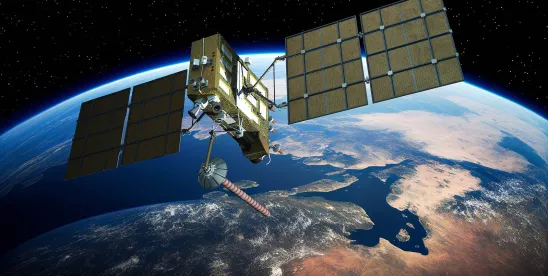You know who your friends are. You’ve known them for a long time, you understand one another, and, importantly, you trust each other.
Well, countries have friends too. Maybe country-friends have similar foreign and national security policies, rather than similar hobbies. And perhaps country-friends have aligned economic interests with their friends, rather than that time you both got that terrible haircut you thought was so cool back then. Importantly, the countries, like you, trust their friends.
On the basis of that trust, allied countries can build relationships that create economic opportunities. Last month, the United States, United Kingdom (UK), and Australia were putting the final touches on their AUKUS agreement to reduce or remove barriers to the exchange of numerous defense articles and technical data. In the October 2024 Space Rules, we now see that export license requirements for certain spacecraft will be lifted for Australia, Canada, and the UK.
We are examining and discussing those rules in a four-part series of blog articles, the third of which we present here. The summary in Section 1 is the same as our other articles, but the rest delves into an EAR rule removing many of the barriers to the exchange of spacecraft and related technology to certain allied countries.
1. The October 2024 Space Rules
On October 17, 2024, U.S. agencies overseeing exports in the space industry[1] issued four new regulatory notices, each of which should reduce compliance burdens and potential confusion that space and satellite companies have faced in the past (the October 2024 Space Rules). All of the regulations appear to be aimed at modernizing U.S. export regulations and keeping the U.S. commercial space industry competitive globally, as follows:
- A rule removing or exempting items from defense export controls, including, among others:
- Decontrolling spacecraft that can dock with commercial space stations, as well as spacecraft with autonomous collision avoidance
- Providing limited exemptions to items for certain space agency programs, space tourism, and space fundamental research
- A rule reducing and clarifying commercial controls on certain items, including, among others:
- Reducing controls on Export Control Classification Number (ECCN) 9A515.x, a catch-all for space-related parts, components, and accessories
- Clarifying rules on spacecraft and launch vehicle export controls
- Clarifying controls on vehicles launched in international waters
- A rule, which is the subject of this blog post, eliminating the export license requirements for certain spacecraft to Australia, Canada, and the United Kingdom.
- A rule adding a new export License Exception for Commercial Space Activities (CSA).
We welcome you to read each rule through the links provided above. However, for those of you who can stand to wait (and who don’t mind our prose), we will provide summaries of each new rule throughout the week.
Below, please find our overview of the third October 2024 Space Rule, wherein BIS removes license requirements for certain spacecraft when exported to Australia, Canada, or the UK. This final rule was issued on October 23, 2024 and currently is in effect.
2. Removal of Worldwide License Requirement for Certain Spacecraft
Under the new final rule, certain spacecraft capable of imaging asteroids, stars, and other planets, or able to monitor the Earth’s surface for fire damage, crop health, or the state of the marine environment, will no longer require a license to export to our friends in Australia, Canada, or the UK. Those spacecraft are critical as we examine our planet from above and so many others from our little corner of the universe.
Additionally, we may now more freely share with our friends spacecraft that provide services to other spacecraft, such as docking, delivery, refueling, or servicing. Those service craft will be increasingly important as space stations launched by government and by the private sector proliferate. The stations will need supplies, repairs, and services and the demand for spacecraft capable of delivering those things will almost certainly increase. Now, such spacecraft can be produced and exchanged among friends (that is, without a license to Australia, Canada, or the UK).
For the full list of what may now be exported without a license to the CANAUKUS group (we welcome your suggestions for catchier names for the trading bloc) we recommend a review of ECCNs 9A515.a.1, .a.2, .a.3, .a.4, .g, and ECCN 9E515.f.
3. Strengthening the Space Bloc
Justifying this regulatory change, BIS acknowledged the strong ties and collaborative efforts in space and defense noting that the three countries participated in the National Technology and Industrial Base (NTIB). The NTIB is a framework that aims to integrate the industrial and technological resources of its member countries to support mutual defense and space exploration goals.
As we described in a previous blog post, we expect to see an increasing trend of countries getting together in various blocs in which the internal barriers to export are reduced or removed, while the external controls are aligned. In such arrangements, trade can flourish within the group of friends without sacrificing the security of controls on critical items to the outside world. Along with the reduced controls for other parts in the spacecraft industry, which we discuss in part 1 and part 2 of this series, the regulatory movement of keeping our friends closer is becoming increasingly pronounced.
4. Status of the Rules
DDTC’s proposed rule largely revises ITAR USML Categories IV and XV and was published in the Federal Register on October 23, 2024. Comments for the proposed rule must be received by DDTC no later than Friday, November 22, 2024.
BIS published revisions and additions to its space-related export controls which are detailed in a an IFR, a final rule, and a proposed rule. The IFR and final rule are effective October 23, 2024. Comments for the IFR and proposed rule must be received by BIS no later than Friday, November 22, 2024.
5. More to Follow
This is the third of four blogs with the fourth following this week.
We continue to monitor these developments and expect to see additional tweaks and guidance in the future. We will, of course, keep our readers updated.
We welcome your questions and comments at the contact information of the authors.
FOOTNOTES
[1] The U.S. Department of State Directorate of Defense Trade Controls (DDTC) which promulgates and enforces the International Traffic in Arms Regulations (ITAR), and the U.S. Department of Commerce Bureau of Industry and Security (BIS) which promulgates and enforces the Export Administration Regulations (EAR).





 />i
/>i

